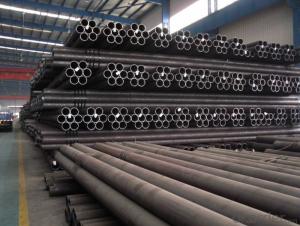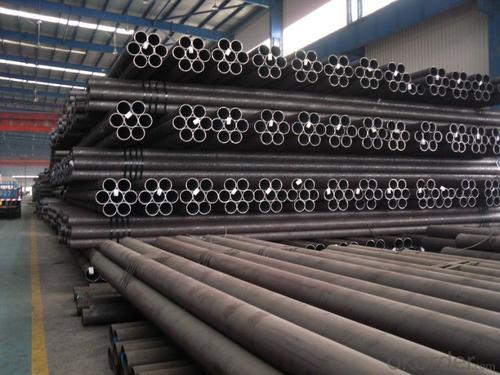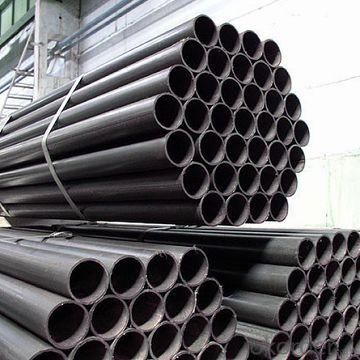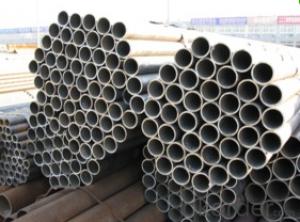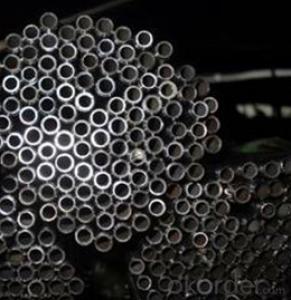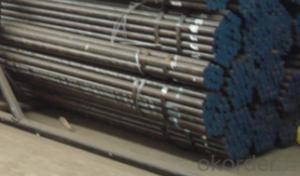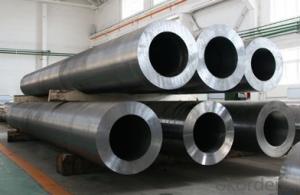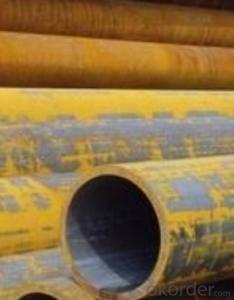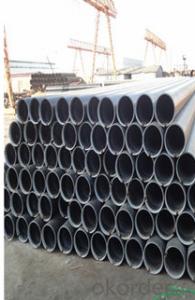Steel Pipe For Carbon Seamless ,15CrMo, Cnbm
- Loading Port:
- Qingdao
- Payment Terms:
- TT OR LC
- Min Order Qty:
- 10 pc
- Supply Capability:
- 30 pc/month
OKorder Service Pledge
OKorder Financial Service
You Might Also Like
Quick Details
Thickness: 6 - 50 mm Section
Shape: Round
Outer Diameter: 33 - 600 mm
Secondary Or Not: Non-secondary
Application: Fluid Pipe
Technique: Hot Rolled,Hot Rolled,Cold Drawn,Hot Expanded Certification: API Surface Treatment: Beveled end or plain end or varnished as per buyer
Special Pipe: API Pipe Alloy Or Not: Non-alloy
Brand Name: XPY(Xinpengyuan)
Length: 6-12m or according to clients' requirements
Standard: BS 3059-2,JIS G3454-2007,GB 5310-1995,GB 3087-1999,GB/T 8163-1999,GB/T 8162-1999,GB 6479-2000,DIN 1629/3,DIN 2448,ASTM A106-2006,ASTM A53-2007,API 5CT,API 5L,BS,JIS,GB,DIN,ASTM,API
Grade: 20#,45#,15CrMo,12Cr1MoV,16Mn,A53(A,B),A106(B,C),API J55,API K55,API N80,API P110,St52,St45,Q235,Q345,10#-45#,Cr-Mo alloy,A53-A369,API J55-API P110,ST35-ST52,Q195-Q345
Packaging Detail: Beveled end , plain end, varnished, or adding plastic caps/ according to customers' request
Bundles or loose, each bundles with 8 steel strips and
nylon slings wrapped with water proof plastic cloth.
We also pack our products according to customer’s requirement
- Q: What is the purpose of a steel pipe coating?
- The purpose of a steel pipe coating is to provide protection to the pipe from corrosion and other environmental factors that can lead to deterioration. Coating the pipe with a layer of material helps to create a barrier between the steel and the surrounding environment, preventing direct contact and reducing the risk of corrosion. This is especially important for pipes that are used in industries such as oil and gas, water distribution, and construction, where they are exposed to harsh conditions such as moisture, chemicals, and extreme temperatures. The coating also helps to enhance the durability and longevity of the pipe, ensuring that it can withstand the demands of its intended application. Additionally, certain types of pipe coatings can also provide insulation properties, preventing heat loss or transfer in applications where temperature control is critical. Overall, the purpose of a steel pipe coating is to protect the pipe, extend its lifespan, and ensure its optimal performance in various industries and environments.
- Q: How do steel pipes handle ground settlement?
- Steel pipes are generally robust and durable, making them well-suited for handling ground settlement. The flexibility and strength of steel allow the pipes to withstand the shifting and settling of the ground without significant damage. Steel pipes have a high resistance to deformation, which means they can maintain their shape and structural integrity even when the ground settles or moves. When the ground settles, steel pipes can accommodate the movement by flexing and bending slightly. This flexibility allows them to adjust to changes in the ground without breaking or cracking. Additionally, steel pipes are often designed with joints that can absorb and distribute stress caused by ground settlement. Furthermore, steel pipes have a smooth interior surface that minimizes friction and resistance to the flow of materials. This feature is particularly important when the ground settles because it reduces the likelihood of clogs or blockages due to debris or sediment settling in the pipes. In summary, steel pipes are well-equipped to handle ground settlement due to their strength, flexibility, and resistance to deformation. They can adapt to the movement of the ground without compromising their structural integrity, making them a reliable choice for various applications, including underground infrastructure and pipeline systems.
- Q: What is the cost of steel pipes compared to other pipe materials?
- The cost of steel pipes compared to other pipe materials can vary depending on several factors including the size, grade, and availability of the specific pipe materials. However, in general, steel pipes tend to be more cost-effective compared to other pipe materials. This is because steel is a widely available and versatile material that can be easily manufactured and fabricated into various pipe sizes and shapes. Compared to materials like copper, stainless steel, or plastic, steel pipes are often more affordable due to their lower manufacturing costs. Additionally, steel pipes have a longer lifespan and superior durability, which makes them a cost-effective choice in the long run. They are resistant to corrosion, withstand high pressure and temperature, and can be used in a wide range of applications including plumbing, construction, and infrastructure projects. It is important to note that the cost of steel pipes can still vary depending on market conditions, demand, and location. However, overall, steel pipes are generally considered to be a cost-effective option compared to other pipe materials.
- Q: Can steel pipes be used for conveying steam?
- Yes, steel pipes can be used for conveying steam. Steel pipes are commonly used in steam systems due to their high strength and durability, as well as their ability to withstand high temperature and pressure conditions. However, it is important to ensure that the steel pipes are properly insulated and the system is adequately designed to prevent any potential issues such as corrosion or thermal expansion.
- Q: How to make the magnetic steel, can be like a magnet?
- Of course, not all materials can be magnetized, austenitic stainless steel will not do.
- Q: How are steel pipes used in water treatment plants?
- Steel pipes are commonly used in water treatment plants to transport and distribute water throughout the facility. They are used for various purposes, such as conveying raw water from the source to the treatment plant, distributing treated water to different areas, and carrying wastewater to the appropriate treatment processes. The durability and strength of steel pipes make them suitable for handling the high pressure and corrosive nature of water in these industrial settings.
- Q: How are steel pipes used in the manufacturing of boilers?
- Steel pipes are an integral component in the manufacturing of boilers due to their strength, durability, and heat-resistant properties. Boilers are used to generate steam or heat water for various industrial and commercial applications. Steel pipes are primarily used in the construction of boiler tubes, which serve as the main heat transfer medium. These tubes are subjected to high temperatures and pressure, making it crucial to use a material that can withstand these extreme conditions. Steel, with its excellent mechanical properties and resistance to corrosion, is the ideal material for this purpose. The manufacturing process of boilers involves forming the steel pipes into specific shapes and sizes to create the boiler tubes. These tubes are then connected to form a network of channels through which hot gases or water flow. The steel pipes used in this process are often seamless or welded, depending on the requirements of the boiler design. The steel pipes used in boilers must meet stringent quality standards to ensure the safety and efficiency of the system. They are tested for their ability to withstand high pressure, temperature, and corrosion. Additionally, they undergo various inspections and tests, such as ultrasonic testing and radiographic examination, to detect any defects or flaws that could compromise the boiler's performance. In summary, steel pipes play a crucial role in the manufacturing of boilers by serving as the primary material for boiler tubes. Their strength, durability, and heat-resistant properties make them suitable for withstanding high temperatures and pressure. These pipes undergo rigorous testing to ensure their quality and reliability in creating efficient and safe boiler systems.
- Q: How are steel pipes protected against soil movement or settlement?
- Steel pipes can be protected against soil movement or settlement through various methods. One common method is to use protective coatings on the pipes. These coatings act as a barrier between the steel and the soil, preventing direct contact and reducing the risk of corrosion. Some commonly used coatings include epoxy, polyethylene, and zinc. Another method is to use cathodic protection. This involves the installation of sacrificial anodes along the pipeline. These anodes corrode instead of the steel pipes, protecting them from damage caused by soil movement or settlement. Furthermore, proper design and installation techniques can also help protect steel pipes against soil movement or settlement. For instance, engineers may consider factors such as soil composition, slope stability, and potential for ground movement when designing the pipeline route. Additionally, proper trenching and bedding techniques can help ensure that the pipe is adequately supported and protected against settlement. Regular inspection and maintenance are also crucial for protecting steel pipes against soil movement or settlement. Monitoring the condition of the pipeline, including the protective coatings and cathodic protection systems, can help identify any potential issues and allow for timely repairs or replacements. Overall, a combination of protective coatings, cathodic protection, proper design and installation techniques, and regular maintenance can effectively protect steel pipes against soil movement or settlement.
- Q: Is the steel frame on each floor supporting formwork (floor) called full scaffolding?
- Full house scaffold is mainly used in the decoration construction of the single storey workshop, exhibition hall, gymnasium and so on. It consists of vertical pole, cross bar, diagonal brace and scissors support
- Q: What is the difference between seamless steel pipes and seamless alloy steel pipes?
- The main difference between seamless steel pipes and seamless alloy steel pipes lies in their composition. Seamless steel pipes are made from carbon steel, while seamless alloy steel pipes are made from various alloying elements such as chromium, nickel, or molybdenum. These alloying elements enhance the properties of the steel, making it more resistant to corrosion, higher in strength, and suitable for specific applications in industries like oil and gas, chemical, or power generation.
Send your message to us
Steel Pipe For Carbon Seamless ,15CrMo, Cnbm
- Loading Port:
- Qingdao
- Payment Terms:
- TT OR LC
- Min Order Qty:
- 10 pc
- Supply Capability:
- 30 pc/month
OKorder Service Pledge
OKorder Financial Service
Similar products
Hot products
Hot Searches
Related keywords
